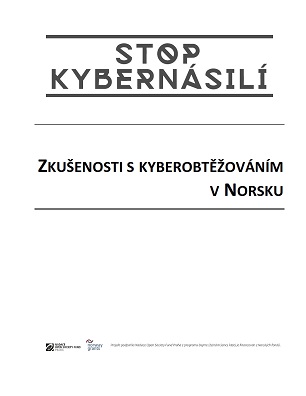
We kindly inform you that, as long as the subject affiliation of our 300.000+ articles is in progress, you might get unsufficient or no results on your third level or second level search. In this case, please broaden your search criteria.

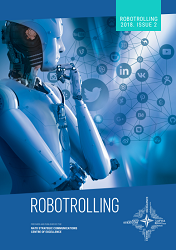
Anonymous users stole the show this quarter. Never before have we observed such high levels of activity from anonymous accounts. At the same time, bot activity in Russian-language conversations about NATO activity in the Baltics and Poland has emerged from its winter slumber. In the wake of the Skripal poisonings in the UK in March, Russian-language bot and anonymous activity about NATO more than doubled. Mentions of NATO on VK, in contrast, have been stable and declining during the whole period. Social media companies are working to end platform misuse. But malicious activity is evolving. Today, anonymous accounts are dominating the conversation. These accounts are either operated manually, or they have become advanced enough to fool human observers. The responses from open and free societies to the problem of online malicious activity have neither been strong enough, nor consistent enough. Figures presented in this issue reveal a disparity between the conversation quality in English and Russian-language spaces. Currently, the Russian-language conversation about NATO in the Baltics and Poland has six times the proportion of content from bot and anonymous accounts. As Twitter has taken steps to remove bots, the disparity has only widened. We assess that 93% of Russian-language accounts in our dataset are operated anonymously or automatically. In no way does this conversation mirror opinions of citizens. Journalists, policy makers, and advertisers take note!
More...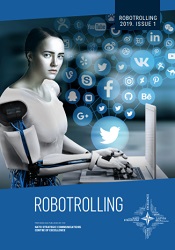
This report presents top-level findings from the first research project to systematically track and measure the scale of inauthentic activity on the Russian social network VK. On VK, a vocal core consisting of loyal news media, pro-Kremlin groups, and bots and trolls dominates the conversation about NATO. The volume of material from this core group is such, that overall genuine users account for only of 14% of the total number of messages about NATO in the Baltic States and Poland. The spread of demonstrably fake content can offer a starting point for measuring how social media manipulation impacts genuine conversations. In the case of one story about a fictitious Finnish blogger, our algorithm estimates that at least 80% of users who shared the fake story were authentic. This quarter, messages appeared in more than 2 000 different group pages on VK. Setting aside messages from group pages, 37% of VK posts came from ‘bot’ accounts—software that mimics human behavior online. This level of activity is comparable to what we have seen on Russian-language Twitter. Unlike on Twitter, where the vast majority of human-controlled accounts are operated anonymously, on VK most accounts are likely to be authentic. Western social media companies have belatedly taken an active role in reducing the reach of the Kremlin’s social media manipulation efforts. However, it remains hard for researchers to evaluate the effectiveness of these measures on platforms such as Facebook and Instagram. In this context, VK offers a cautionary view of a network with minimal privacy, regulation, and moderation.
More...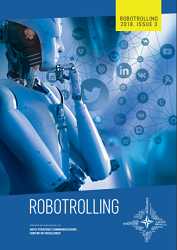
President Trump’s whirlwind tour of Europe in July provoked ferocious discussion about NATO on social media. Anonymous human-controlled English-language accounts, expressing positions in support of or in opposition to the US President, dominated online conversations. Compared to the levels observed in the Spring issue of Robotrolling, the volume of English-language messages has more than doubled. The increasing proportion of anonymous accounts active during key political moments indicate that anonymity is being abused to cloak manipulation on social networks. We call on social media companies to keep investing in countering platform misuse. The social media companies Reddit and Twitter have released lists of accounts identified as originating from the notorious St Petersburg ‘troll factory’—the Internet Research Agency (IRA). In this issue, we present the first quantitative analysis comparing English- and Russian-language posts from these accounts. The IRA bombarded citizens in Russia and its neighboring states with pro-Kremlin propaganda. For English, fake accounts posed as Trump supporters, and argued both sides of the Black Lives Matter controversy. Russian-language material closely echoed and amplified the narratives popularized by Russian state-media. Amongst the accounts identified by Twitter, 26 also posted about NATO in the Baltics and Poland. Our algorithm correctly identified 24 of these as bot accounts. The other two accounts were anonymous human-controlled (troll) accounts.
More...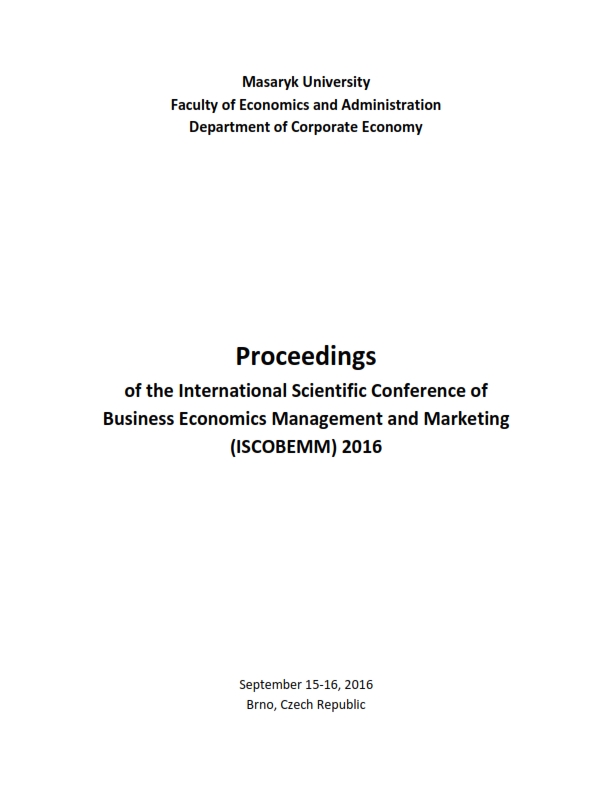
The purpose of this paper is to investigate on the potential role of social media in value co-creation relationships in a marketing and management perspective. It goes without saying how we witness importance of social media in achieving general marketing goals. Moreover, concept of value co-creation implies management initiative to develop closer and mutually beneficial interactive relationships between company and customers in order to further jointly cocreate acceptable outcome for parties involved. Authors will try to give a theoretical overview of potential portrayal of social media as a communicational channel/tool and its eventual footprint on value co-creation. What are the social media marketing and management elements useful to shape and influence the process of value co-creation? How did the academic public approach and elaborate this consanguinity? Primarily, by observing theoretical developments throughout academic prism, authors have been very much interested to tackle these questions. The research performed is theoretical, secondary-desk analysis. Publicly available sources of literature have been utilized. Academia shares contrasting attitudes when it comes to potential roles of social media in value co-creation. A group of analysed authors strongly supports this statement, whilst we have another cluster of authors who are severely opposing and claim that no solid findings are possible until more primary researches are performed.
More...
The paper deals with two current topics, which are social networks and personnel marketing. The review of literature in the paper is focused on the synergy that results from this connection. Personnel marketing as a new field defines an employee as a customer. To achieve higher satisfaction of this customer specific communication channels are used and social networks are one of them. This paper presents a two-level primary research. We have chosen the topic of the paper to fill in the information gap in the application of personnel marketing. The primary qualitative research using in-depth interviews has been applied for this purpose. It resulted in the identification of opportunities in the use of social networks, which was the first partial objective. These attributes were then used in primary quantitative research using electronic questioning. It resulted in the comprehensive overview of the importance of different options for the HR work and in the achievement of the second partial objective. The research was also focused on determining whether the size of the company influences the research result. The paper presents an overall summary of ways how to use social networks and shows the importance of the various ways through which the main objective of the research was achieved. The paper may serve as basis for future theoretical research, as well as it can help companies to implement social networks in their activities and thus increase their competitiveness.
More...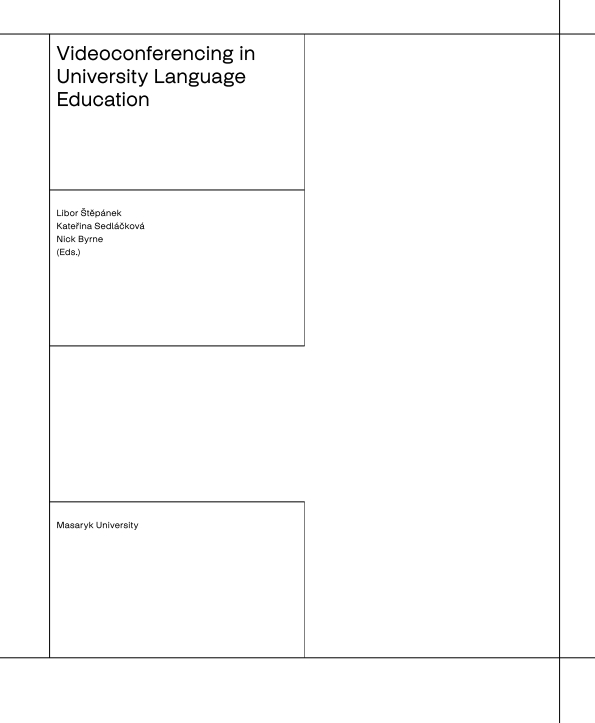
The authors concentrate on the variety and scope of roles filled by learners, the potential development of associated transferable skills, and the way videoconferencing facilitates this process. Key learner roles and their outcomes are described. Detailed advice is given as to how students can maximise their skills and how technology can best support them. A range of task-based collaborative activities are presented, and the underlying theory and practice are both described in order to balance their rationales.
More...
This chapter gives voice to the students using videoconferencing, in some cases for the first time. By doing so, a clear picture emerges of the challenges, frustrations, but ultimately beneficial experiences felt by students. The views and feelings expressed act as useful compass points for teachers setting up such courses. These can be helpful in avoiding future pitfalls.
More...
The authors use a case study with students of law to illustrate both the possibilities and limits of videoconferencing. This detailed article outlines the stages of course development, syllabus writing, integration of subject matter and technology, and mechanisms to ensure a successful outcome. Useful advice is provided not only in technical aspects but also in areas related to interpersonal transactions. This includes ensuring that student groups from different countries have time to acquaint themselves informally before embarking on the more formal aspects of the programme.
More...
The authors offer a detailed and informative insight into the changing role of the teacher in light of technology-driven changes in classroom teaching. Videoconferencing is an area which both demands and inspires a new methodology, and this article outlines the variety of specific but interlinked roles which help to ensure successful delivery. The case study chosen provides a wealth of examples which illustrate the scope of collaborative teaching and learning made possible by videoconferencing. These examples also provide a clear indication of the required skills and the consequent need for targeted staff development programmes to help develop the teachers of the future.
More...
The author underlines the importance of having a clear rationale for using videoconferencing. A detailed case study illustrates the pitfalls and challenges of technology and looks at key examples of mismatching. These include mismatches between the different expectations of students and teachers, between theory and practice, between desired aims and actual outcomes, and between the ideal applications and actual limitations of the technology on offer. The article discusses a range of problems and issues but also points to solutions and workarounds. It emphasises the importance of considering not only how technology is used and which type is chosen but also why technology is used at all.
More...
The author presents a personal and professional overview of key technology issues in videoconferencing. The tone is both authoritative and informative, and the range of information covers most aspects of use. It provides a good introduction to videoconferencing for the novice, whilst existing users will benefit from the detailed options outlined in the technical sections. The article will help teachers not only to expand their knowledge of this developing field but also to organise their videoconferencing courses.
More...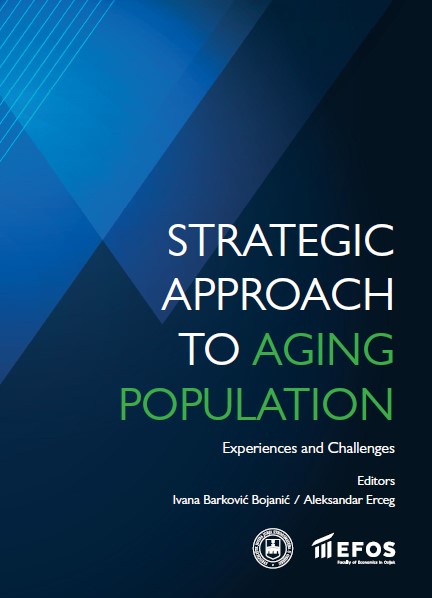
Digitalization has emerged as a critical driver, enabler, and supporter of plenty of socio-economic processes in the contemporary digital economy. Since the world population is continually aging, information and communication technology (ICT) is considered a factor in the aging process qualitative shift. Creative aging is identified as a form of active aging. The adoption of digital technology by the elderly population is considered a precondition for their active aging. This study aims to investigate the opportunities for creative aging of the elderly population. The study examines the experiences of the EU countries in relation to ICT promoted creative aging and reducing social isolation among the older population. Through in-depth research, the study is mainly focused on analyzing older adults aged 65+ in the Macedonian and Croatian economy, exploring how they embrace ICT in favor of creative aging.
More...
Digital literacy is an essential skill that teachers need to effectively use technology in their classrooms. The relationship between middle school mathematics teachers' digital literacy and their levels of technology use in the classroom is important for facilitating the effective use of technology in educational processes. However, there is a lack of sufficient empirical studies examining the meaningful relationship between these two skills. This study aims to investigate the relationship between middle school mathematics teachers' digital literacy and their levels of technology use in the classroom. The research was conducted using a correlational survey model, and 132 middle school teachers participated voluntarily, selected through convenient sampling method. Data were collected using a personal information form, a digital literacy scale, and a scale for determining the level of technology use in mathematics classes. The collected data were analyzed using descriptive statistics, Pearson correlation coefficient analysis, and multiple linear regression analysis. The research findings indicate that middle school mathematics teachers have a high level of digital literacy and a moderate level of technology use in mathematics classes. Furthermore, a significant positive correlation at a moderate level was found between these two skills. The study also revealed that the sub-dimensions of digital literacy, namely attitude, technical, cognitive, and social variables, together significantly predicted the levels of technology use in middle school mathematics teachers' classes, explaining 36% of the variance in technology use. According to the importance order, it was determined that the social, attitude, and cognitive sub-dimensions were significant predictors of technology use in mathematics teachers' classes, while the technical sub-dimension was not a significant predictor.
More...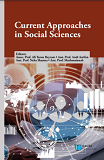
Artificial intelligence is one of the hot themes of the current public discussion with accounts associating it with transformations in especially manufacturing sectors which is usually expected to lead to massive unemployment. The public is keen on speculating about which jobs will be made redundant by the rise of AI and ultimately disappear. In addition to factories, the health sector is one of the sites of contestations as many medical tasks are getting automated. Some other scholars do not agree with this panic atmosphere. They claim that like any other industrial transformation, the rise of AI will also create new jobs. Although social implications of the rise of AI are under the spot, it is hard to come up with a single view among various views shared by scholars of various disciplines and strands of research. This article summarizes and elaborates on various positions on the topic, with a sociologically critical perspective, keeping an eye on AI’s highly likely role in exacerbating the already biting social inequalities and injustice. The sociology of artificial intelligence is delineated along with the ethical issues raised by the expansion of artificial intelligence in our daily lives, keeping the possibility of a humane artificial intelligence in mind.
More...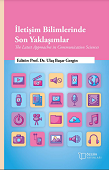
Art is the event of willingly and consciously transferring an emotion that manifests in humans. Considering that with art raises and exalts the human soul; art is related to human inspiration and creativity. As a result of the changing social structures with the modernization process, mass culture influenced art. In this study, it is thought that art, which has a unique structure, does not fit into a utilitarian pattern in its essence, however, it transforms into a kind of good with the spread of mass culture, and with that, the creativity of art in a utilitarian identity has deeply affected. Artificial intelligence, which enters all areas of life and affects human life, has begun to manifest itself in many areas requiring emotion, including the art field. The art is associated with emotion, however, the commodification of the concepts of inspiration and creativity together with modernization on the basis of popular culture has deepened and has changed dimensions with the presence of artificial intelligence in the field of art. In art, which is the expression of human emotion, it is thought that artificial intelligence is a kind of replication, not inspiration, to attempt to perform art through software installed to itself away from emotion and creativity. The study sought to answer the question of whether art can be performed emotionally with the development of technology based on the literature reviews. As a result, it is thought that high art, which has lost much of its essence with mass culture, will negatively affect art, artistic production, and the artist in the near future with the existence of artificial intelligence enabling and attempting to perform art. Without emotion, the meaning of art will lose, rather than change.
More...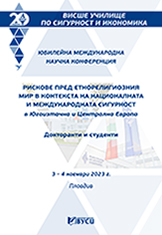
In today`s digital world, threats to national security are growing in cyberspace, the virtual environment where computer systems and networks operate, and data and information are exchanged and stored. These threats are manifested through various cyber-attacks aimed at disrupting the operations of state institutions and security systems, affecting the economic interests of private companies and the normal functioning of civil society. Information security is crucial in today`s digital realm by protecting data, systems, and resources from various threats and risks.
More...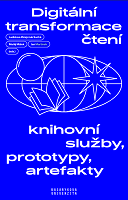
V poslední kapitole se díváme na budoucnost webových knih a digitálního čtení perspektivou designové spekulace. Prostřednictvím identifikace trendů se snažíme formulovat možné budoucnosti a přemýšlet o (ne)materialitě knihy či čtení v post-antropické budoucnosti. Kapitola je zkráceným a upraveným výňatkem z rozpracovaného disertačního výzkumu, který probíhá v rámci doktorského studia v Ateliéru grafického designu na Fakultě multimediálních komunikací Univerzity Tomáše Bati ve Zlíně.
More...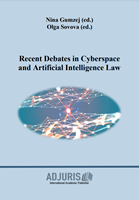
Public administration intends, as in all modern countries, to solve public affairs, it is linked to the state system, and it must act for the common good. Continuous adaptation to society's needs is a constant concern of public authorities. One such concern is the digitalization of public services, which consists of a set of activities necessary to adapt all legally regulated processes to transfer the stages of their fulfillment to automated information technology infrastructures organized by artificial intelligence. In this article, starting from the purpose of the public administration, using the logical interpretation, as well as the comparative analysis, we aimed at highlighting the need for the digitalization of public services and the benefits of this process, in the context of a complex legislative framework, emphasizing, at the same time, the difficulties of correlation with economic and social impact in public administration. The digitalization of public services is a mandatory requirement, which will represent a solution for the uniqueness of the stages within the technical-material operations, aspects that will eliminate any possible violations of fundamental rights and freedoms. Digitalization aims not only at facilitating citizens' access to the benefits of public services, but also at changing the perception of citizens towards the public administration, the goal being the achievement of a transparent public administration, as close as possible to the citizen.
More...
To write about a branch of law entitled "new technologies" places us in a challenging but topical realm because we can only identify in a fragmentary way the meaning of a set of legal rules that have been promulgated by the legislature, and even less the positive law that is actually applicable at national level or even in most EU countries. However, it is not only with this thought that we proceed in the conception of the present material, but also with the idea that has become dominant as a business concern, an idea that highlights the prerogative of any person to "try his luck" by concluding a coded agreement , using a laptop and at the same time at least one other subject of law willing in consensus to use blockchain technology. We can also visualize the public official automatically enrolled in the digitization process, acting as a "business partner" of the public administration and performing in the context of the current legal area mismatch service duties using blockchain technology in energy market procurement. To conclude a so-called "smart contract" by means of blockchain technology certainly implies an agreement of wills and the typed intention of the parties concerned in a legal framework not regulated by general legal rules or specific and applicable particular provisions. We thus aim to quantify and even outline a legitimate content with finality, which aims at what as early as 2018 at the level of the Committee on International Trade was highlighted and expressed in the Report4 indicating blockchain technology as a policy and business practice of the future that seems to have already caught up with us. This paper proposes a statistical study that reflects the integration of the concepts of blockchain technology and smart contracts into the knowledge of legal-administrative practice in Romania.
More...